Asian countries take a stand against the rich world’s plastic waste
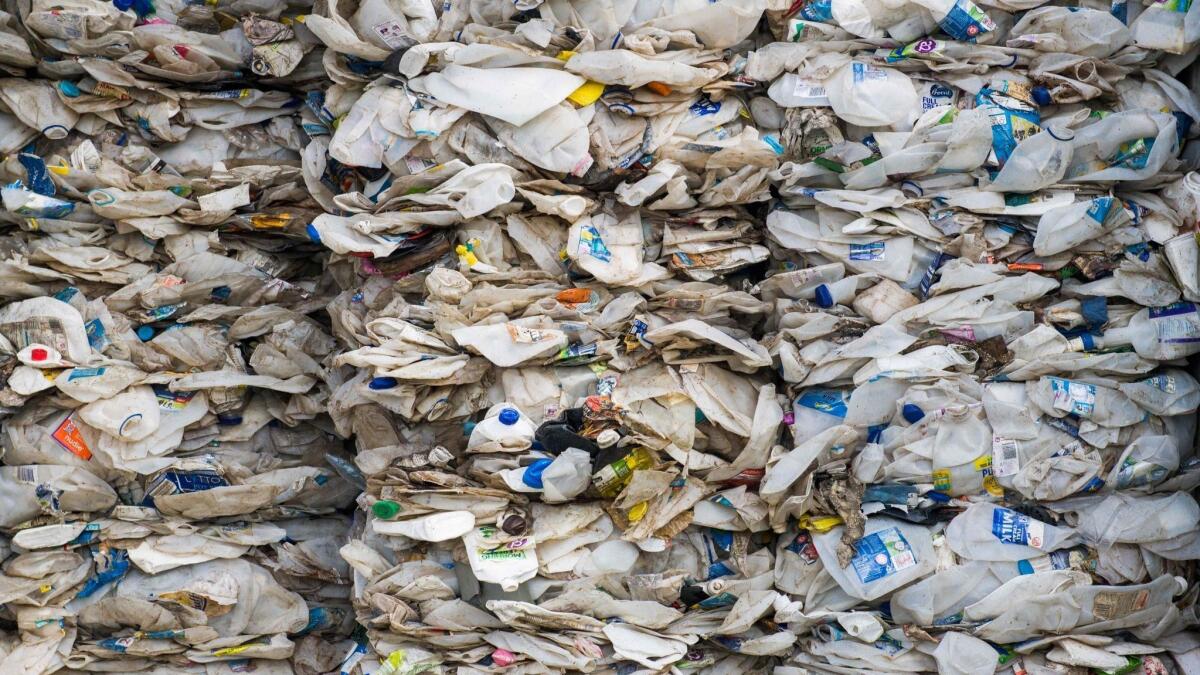
- Share via
Reporting from Manila — When the MV Bavaria cargo ship chugged out of a Philippine port one morning last month carrying 69 containers of rotted Canadian garbage, it didn’t just end a messy diplomatic spat between the two countries.
It also signaled a sea change in the global recycling system.
After years of pressure, Canada had agreed to take back the waste, which had been exported to the Philippines beginning in 2013 falsely labeled as plastic scrap. The shipments were part of a decades-old practice in which rich countries including the United States sent used plastic to Asia to be recycled. Often, the shipments included contaminated waste that couldn’t be recycled but made it past customs checks anyway, and countries had few legal avenues to send it back.
That began to change 18 months ago, when China, the biggest consumer of discarded plastics, banned nearly all waste imports to stop the smuggling of non-recyclable scrap. The trade in plastics quickly rerouted to neighboring Southeast Asian countries that lacked effective recycling plants and disposal laws, leaving much of the waste to be burned or dumped in fields and waterways, creating health and environmental hazards.
Now those countries are closing their doors too.
Amid a growing global movement against non-recyclable plastic, Vietnam and Thailand have said they will block all imported plastic waste in the next few years. Taiwan announced it would accept only plastic scrap if sorted into a single type, making it easier to recycle.
The Philippines and Malaysia are also considering outright bans and have led the way in demanding that exporting countries take back containers of waste that entered its ports illegally, often with improper documentation. Indonesia said last week that it had sent five containers of Canadian scrap paper back to Seattle, the transshipment point, after discovering that used plastic, wood, diapers and shoes were also packed inside.
“Countries in this region are bucking this whole idea that they should be dumping grounds for the world’s waste,” said Lea Guerrero, a Greenpeace activist in the Philippines.
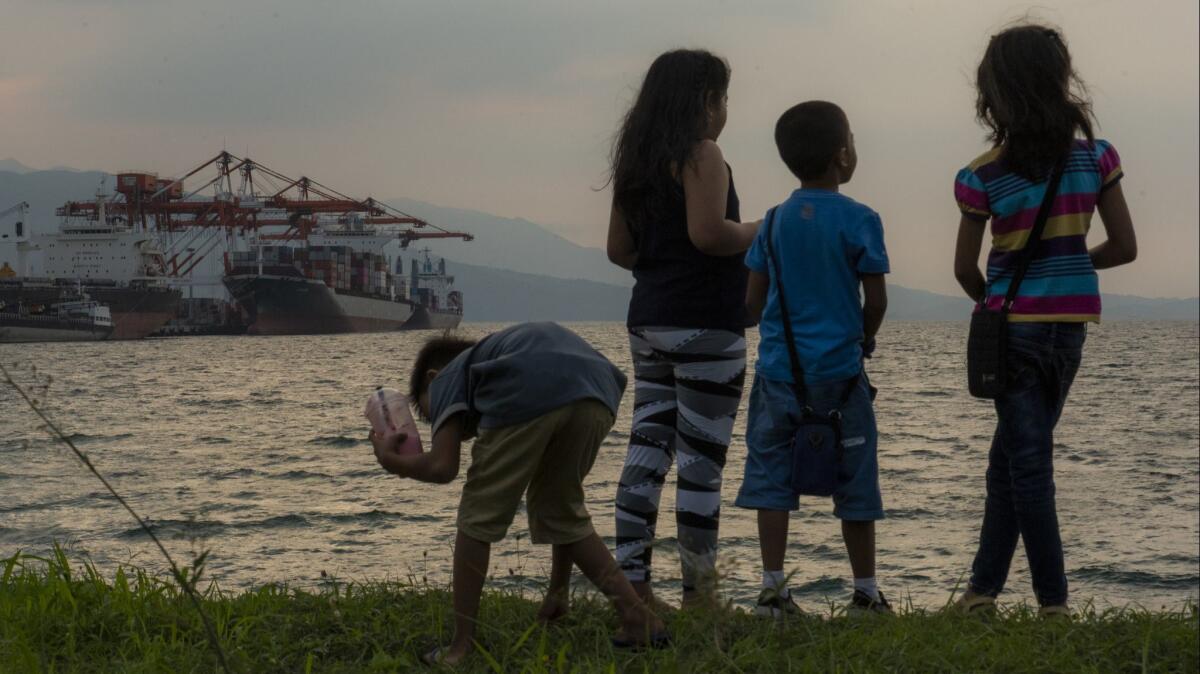
The outcry over plastic has echoes of three decades ago when the United States routinely shipped dead car batteries, mercury-laced concrete and other toxic materials to the lightly regulated shores of Southeast Asia.
A 1989 global treaty known as the Basel Convention placed significant restrictions on the shipment of hazardous waste to poor countries but left open a loophole for materials — mainly plastic — that were designated for recycling. The U.S., as one of the few countries that has not ratified the treaty, can export hazardous wastes only under bilateral agreements, one of which it has with the Philippines.
In May, at a meeting in Geneva, representatives of more than 180 countries agreed to expand the treaty to include most plastic waste, placing it under the same trade restrictions as toxic substances.
It was a belated acknowledgment that although plastic has long been marketed as a reusable material, much of it cannot be recycled because it is dyed, contains food or liquid residue, or is mixed with other non-recyclable waste.
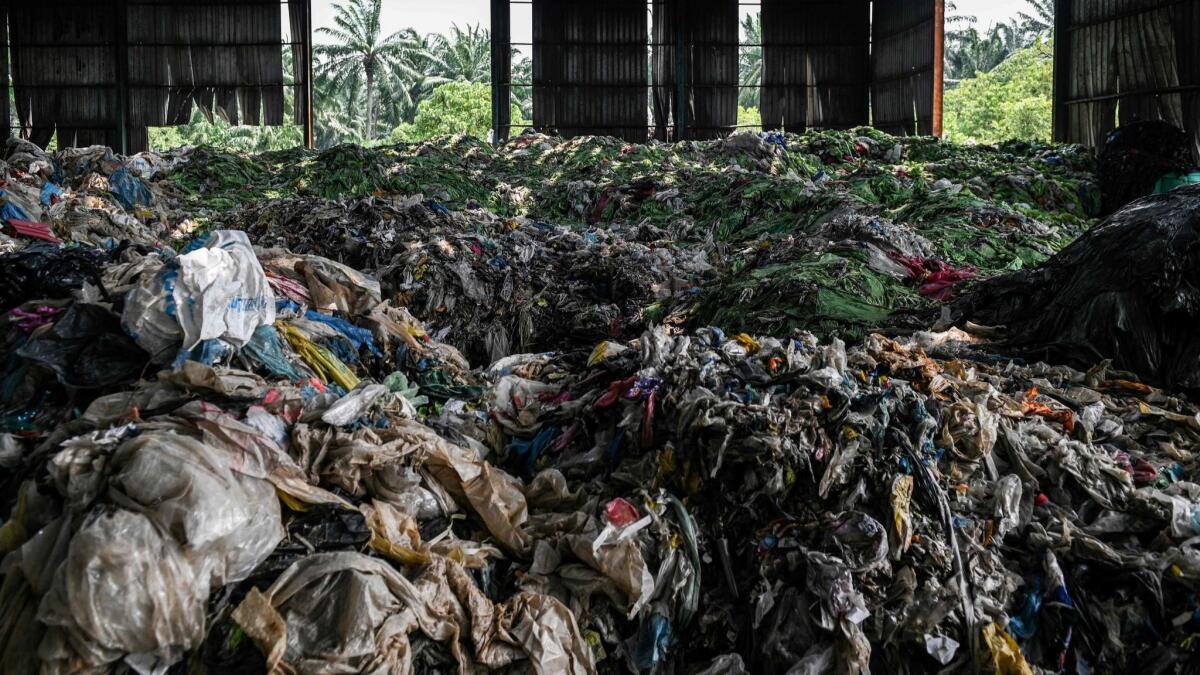
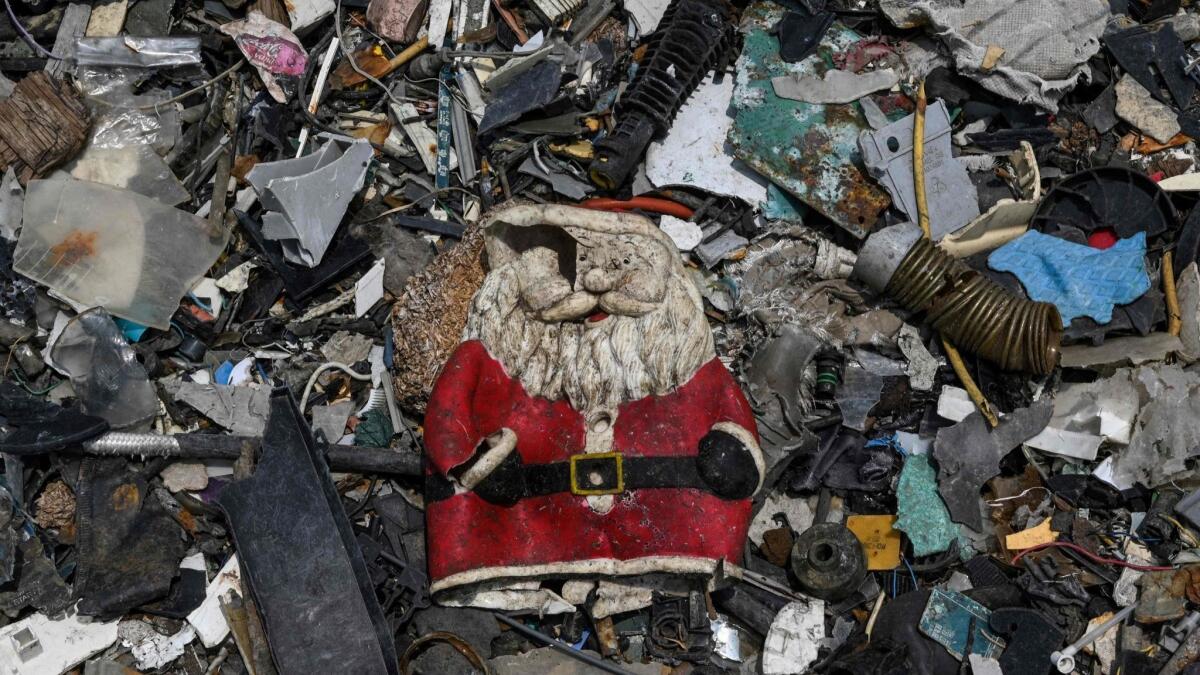
“Ever since the Basel Convention was developed, there was always an eye toward addressing plastics, but the biggest challenge was the political will of countries to take that on,” said Richard Gutierrez, founder of BAN Toxics, an environmental action group in the Philippines.
As long as China was buying more than half the world’s plastic waste — it imported 6.4 million tons in 2017, before the ban was enacted — much of the industrialized world was blind to the fate of its castoff soda bottles, grocery bags, yogurt tubs and other trash.
As global plastic consumption soared to 400 million tons annually — an amount that is projected to double over the next 15 years — no country could match China’s relatively efficient domestic recycling plants or its massive industrial base that repurposed old plastic into new products.
“China’s ban really changed the landscape,” Gutierrez said. “Once they stopped taking in all this plastic, it got people to realize we have a big problem.”
The Basel amendment, which takes effect in January 2021, requires shippers of plastic scrap to obtain prior consent from the destination country, and gives countries the legal authority to refuse unwanted or unmanageable waste.
The case of the Canadian trash in the Philippines shows how countries often have little recourse under existing trade rules to send back illicit plastic shipments.
The roughly 100 total containers that arrived starting in June 2013 were described by Philippine importers as plastic scraps for recycling, but upon customs inspection were found to contain household waste including plastic bottles, plastic bags, newspapers and adult diapers.
Local laws classify those as hazardous materials, and the Philippine government asked Canada to take the shipment back. But for years Canadian Prime Minister Justin Trudeau maintained his government could not intervene because the shipments represented private commercial transactions between Canadian and Philippine companies.
The containers sat in Philippine ports, their contents leaking fluids while festering in the tropical heat. Greenpeace, BAN Toxics and other groups picketed the Canadian Embassy in Manila, while some officials called for abandoning the dispute to preserve diplomatic ties.
In 2015, over strong protests from activists, Philippine authorities dumped the contents of more than two dozen of the containers into a landfill north of Manila.
“For us it was the poster child of the waste trade in Asia,” said Guerrero of Greenpeace. “It just illustrated the disparity between rich and poor countries, and how when rich countries don’t want to take back their trash, poor countries are practically helpless.”
In April, the Philippines’ tough-talking President Rodrigo Duterte threatened to “declare war” over the issue. He recalled his ambassador to Ottawa, banned Philippine officials from traveling to Canada and set a May 15 deadline for the trash to be removed.
The diplomatic offensive worked. Trudeau hired a shipping company to retrieve the remaining 69 containers, which set off across the Pacific on May 30. Duterte’s equally colorful foreign secretary, Teodoro Locsin, tweeted a picture of the ship and the message, “Baaaaaaaaa bye.”
Canadian officials say the roughly 1,500 tons of trash in the containers, due to reach the Vancouver port at the end of June, will be burned at a waste-to-energy facility in British Columbia.
Philippine activists believe many more illicit shipments have gotten through undetected across the vast archipelago of more than 7,000 islands and dozens of ports.
In recent months, customs officials have intercepted waste shipments from Australia, Hong Kong and South Korea that were mislabeled as recyclable goods. In January, South Korea paid to have the first batch of a 6,000-ton shipment — containing household trash including batteries, lightbulbs and diapers — returned from the Philippines.
“We think this is just the tip of the iceberg,” said Beau Baconguis, a Philippine activist with the Global Alliance for Incinerator Alternatives, a nonprofit advocacy group.
“With so many islands, it’s almost impossible to check every port properly. These scandals were exposed by spot checks. I don’t think we have enough trained personnel to determine whether something is recyclable material or just waste.”
Environmental groups are urging Duterte’s government, which supported the Basel amendment, to ratify the change to ensure it is enforced in the Philippines. Officials also are reportedly considering a total ban on waste imports that could close off one of the main remaining outlets for U.S. plastic scrap.
In Malaysia, which last year became the world’s top destination for discarded plastic, officials have closed down 150 unlicensed waste importers. The government announced in May that it would send back more than 3,000 tons of contaminated plastic waste to countries including the U.S., Canada, Britain and Australia, although details of the shipments — including who will foot the bill — have not been worked out.
Malaysia’s environment minister, Yeo Bee Yin, inspected one of the Australian containers recently and found old milk bottles filled with dead maggots.
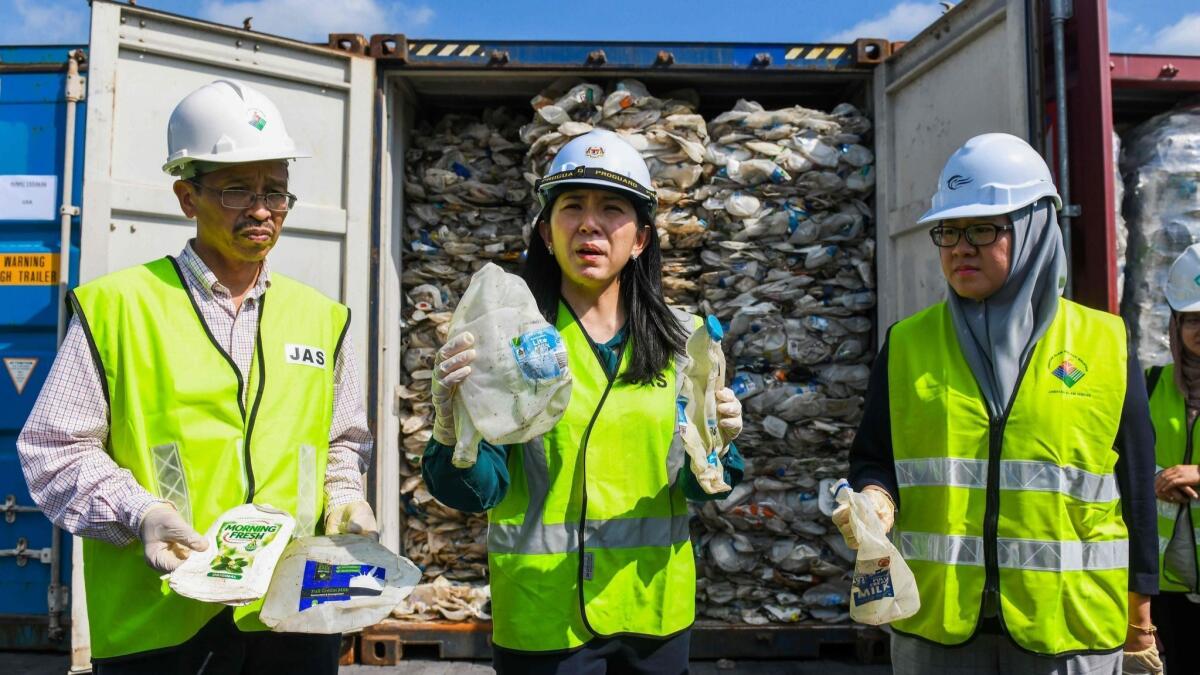
“This is rubbish that you know cannot be recycled, and it makes me really angry that our country has to endure this,” she said in an interview.
Yeo has called for a ban on all waste imports but faces opposition from some in the government who want to support a small but growing recycling industry. She said regional countries should send a message to the industrialized world that waste should be disposed of in the country of origin.
“I believe that low-quality domestic plastics should not be exported, and each country must take care of their own rubbish on their own,” she said.
“When we first discovered this problem in Malaysia, we talked about it as a global problem, and we recognized that we should be a voice for developing countries. If they don’t dump it in my country, they’ll dump it somewhere else. And that has to stop.”
More to Read
Sign up for Essential California
The most important California stories and recommendations in your inbox every morning.
You may occasionally receive promotional content from the Los Angeles Times.












